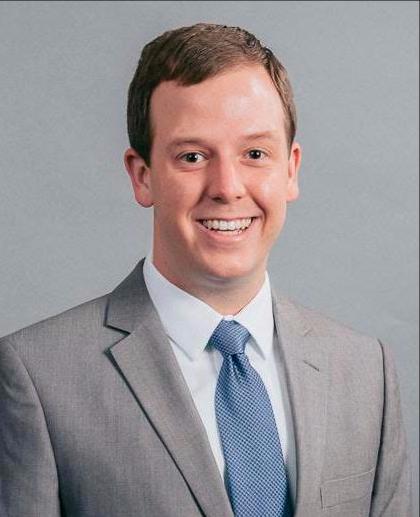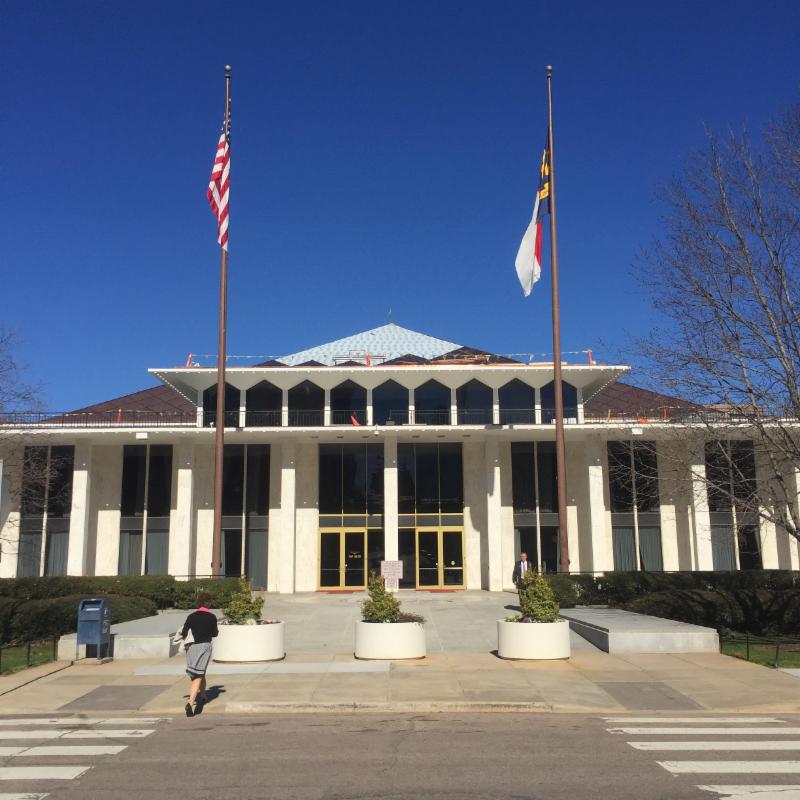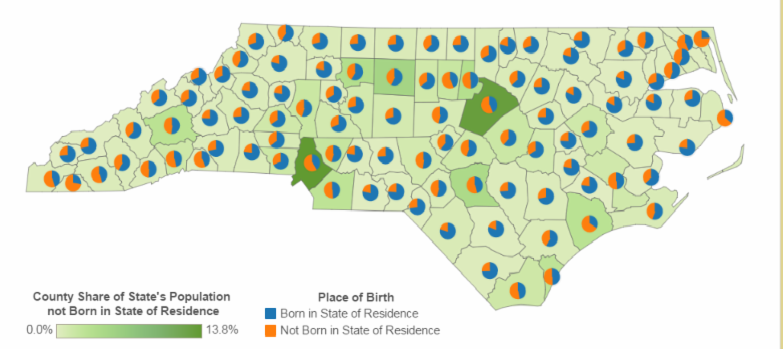|
|
|
February 2017 - In Our Inaugural Issue:
|
|
|
|
|
 |
|
WELCOME TO THE INAUGURAL
RURAL COUNTS
NEWSLETTER
|
The past month has been a time of inaugurations
- the inauguration of a new president, a new governor, and, now, the Rural Counts newsletter!
In his inaugural address last month, President Trump said that it is time for us to listen to the men and women in our nation who have been forgotten. At the Rural Center, we agree that a democracy cannot flourish without the strong, vibrant engagement of all its citizens. We are pleased to see that, even in this time of division, Americans of all political stripes are recognizing that we have to work together in order to achieve a better future...and are getting involved to make that happen.
Governor Cooper, in his own inaugural address, reminded us that North Carolina has accomplished great things by dreaming big and keeping our focus on the future. Through the Rural Center's new advocacy program, we hope to work with you to turn your biggest dreams for your community into meaningful action across the state.
We understand that "advocacy" can be a scary word. It can evoke images of partisan fighting and unruly protests, and fears of angry words and strong stands getting in the way of collaboration and community building. At the Rural Center, we see advocacy differently. For us, advocacy is less "political" than "relational." It's about getting things done
together - whether that be by working with our elected leaders in Washington and Raleigh, or by rolling up our sleeves and working with our neighbors right at home.
We all want to see good jobs for our friends and fellow citizens, an education system that prepares our children for the jobs of the future, healthy communities with great quality of life, and a strong physical infrastructure and sustainable natural environment that supports us all. Over the past year you have helped us craft a
strong set of guiding principles of what it takes to see growth and development in rural North Carolina. Now it's time to work together to put those principles into action through local initiatives, regional collaboration, and state and federal policy.
The Rural Counts newsletter will be your entry point into the ways you can get involved to advocate for your community. In this issue:
- Learn about our efforts to bridge that dreaded "rural-urban divide" and how you can get involved to help us;
- Check out what's happening this year in D.C. and Raleigh and learn ways to get in touch with your elected officials;
- Dive into intriguing data to see how many people in your county were born in North Carolina, and think about how that changes your approach to advocacy in your home; and
- Explore the links from our partners to learn more about issues that matter to rural North Carolina.
And don't forget to put upcoming Rural Center events on your calendar. We will be hosting a training session on grassroots leadership in the wake of Hurricane Matthew on February 28, and our first-ever statewide Rural Day will be on Tuesday, May 9, in Raleigh.
As we start ramping up our advocacy work across the state, I will be reaching out to you to learn more about your interests and how the Rural Center can support the work you already have going. If you'd like to jump start that conversation, or would like me to come speak to your group about Rural Counts, please reach out to me at any time.
Thank you for all you do to support your communities, and thank you for your interest in partnering with the Rural Center on this important advocacy agenda. Together, we can show North Carolina that #RuralCounts!

John Coggin
Director of Advocacy
|
|
 |

FEBRUARY 28: COMMUNITY ALLIES FOR HURRICANE RECOVERY
Register for a training session on grassroots leadership
On Tuesday, February 28th, the Rural Center and a group of partner organizations will host a training event for local nonprofit and grassroots leaders serving communities affected by Hurricane Matthew. The event will provide updates on immediate recovery needs, connect participants to experts and resources, and explore long-term community revitalization strategies. The gathering will kick-start a partnership between community leaders and the key agencies leading the recovery process.
We anticipate having limited space, so we are requesting interested participants complete an application to allow us to ensure representation from as many communities and organizations as possible. Please use the following link:
Who: Nonprofit, faith, and community leaders serving hurricane-affected communities
When:
Tuesday, February 28, 2017;
9:30 a.m - 4:00 p.m.
Where: N.C. Rural Center, 4021 Carya Drive, Raleigh, NC 27610
Cost: Free (application required), travel scholarships are available for those unable to cover their own expenses.
If you have any questions, please contact:
Barry Ryan
Senior Director of Programs
|

MAY 9: RURAL DAY
Join us in Raleigh to show NC that #RuralCounts
For the first time in our history, the Rural Center will be hosting a statewide Rural Day on Tuesday, May 9.
What does this mean? This is your chance to join with hundreds of other rural citizens and advocates to communicate to our leaders a positive message about the value of rural North Carolina.
The day will be filled with one-on-one and group meetings with legislators and executive leaders, educational sessions about various issues facing rural North Carolina, and plenty of time to network with other rural advocates from across the state.
We hope you will help us put rural North Carolina's best foot forward and join us for this exciting, important event. More information coming soon about agenda and registration details, but mark your calendars now. You don't want to miss it!
|
|
NEWS FROM THE RURAL CENTER
|

THE BEST IDEA IN THE NATION?
Joint op-ed receives national attention
Last Sunday, the Raleigh News & Observer published an
op-ed written by Grant Godwin, the chair of the The Rural Center, and Esther Manheimer, the mayor of Asheville and chair of the N.C. Metro Mayors Coalition.
The next day, the article was featured as the #1 Best Idea of the Day by the internationally renowned Aspen Institute. What was this bright idea? That rural and urban communities should work together along shared interests to bridge the "rural-urban divide" and identify policies and practices that work for everyone. We think it's a pretty simple concept, but we also understand it will take some heavy lifting to counter the narrative that the interests of rural and urban citizens are diametrically opposed.
Join us in sharing the news that in North Carolina, our urban and rural leaders are committed to working together for a bright future for all our citizens. Let's spread the best idea in the nation far and wide!
|

THE BIG CRUNCH: DATA FOR ADVOCACY
Using data to appeal to North Carolinians - new and old
Being a strong advocate requires that we have a focused but flexible message that works well with different audiences. How do you make the case for an issue for someone who grew up in your community? How would you make it appeal to an individual who just moved to the community recently? How would you make it to an individual from out of state who just moved to Charlotte or Durham?
North Carolina is a magnet for people from all over the nation and the world. Over half of the people now living in the state were not born here.
This interactive map gives a snapshot of how this varies across the state. The pie charts give the county percentages of who were born in or out of the state. Clicking on the balance of the county tells you the county's percentage of the state total born out of state. You will see a big difference in large urban areas! But there are also differences between rural areas - how does it look in your community? And how will that shape the way you talk about your community's history and needs?
Jason Gray
Senior Fellow, Research & Policy
|
DISPATCHES FROM DC
Actions and priorities of the Trump Administration and 115th Congress
The 115th Congress (2017-2018) began early January and President Donald Trump was inaugurated on January 20. The North Carolina Congressional Delegation is comprised of two Republican Senators, 10 Republican House Members, and three Democratic House Members. NC has good bipartisan representation on the major committees and in leadership positions.
The President's nominees for cabinet and other top-level positions are going through Senate confirmation hearings. To date, the following nominees have been confirmed:
Attorney General - Jeff Sessions
CIA Director - Mike Pompeo
Secretary of Defense - Jim Mattis
Secretary of Education - Betsy DeVos
Secretary of Health and Human Services - Tom Price
Secretary of Homeland Security - John F. Kelly
Secretary of State - Rex Tillerson
Secretary of Transportation - Elaine Chao
US Ambassador to the United Nations - Nikki Haley
Secretary of the Treasury - Steven Mnuchin
Senate hearings for former Georgia Governor Sonny Perdue nominated for Secretary of Agriculture will likely be held late February.
We have now had the opportunity to observe the first couple of weeks of the Trump administration. In that brief time, we've seen the President issue six executive orders and 10 presidential memoranda or directives, for a total of 16 major administrative actions. In addition, Congress is moving forward to approve resolutions under the Congressional Review Act allowing them to nullify specific agency regulations put in place by the Obama Administration.
The top priority of the White House and Congressional leadership remains the repeal and replacement of the Affordable Care Act during the first quarter because the health industry will need time to formulate their plans for 2018. However, leaders have said that nothing will be repealed before there is a concrete practical alternative to offer Americans in place.
Debby Bryant
Federal Government Affairs Consultant
|
JONES STREET JOURNAL
After some first-of-the-year fireworks, 2017 has been marked in Raleigh by waiting and anticipation. Roy Cooper was sworn in as the state's 75th Governor at midnight on January 1, but the public ceremonies for him and the rest of the Council of State were muted by an ice storm passing through the state the weekend of the inaugural celebrations.
The fireworks started as executive and legislative leaders filed multiple lawsuits directed at each other. Major areas of contention include legislative actions to change the structure of the State Board of Elections, to confirm the Governor's nominees for state departments, and to shift the relative powers of the Superintendent of the Department of Public Instruction and the State Board of Education, as well as Governor Cooper's executive action to expand Medicaid.
While waiting for the resolution of these legal battles, leaders from both branches are still moving forward on their agendas. Governor Cooper has made the following appointments:
- Department of Administration - Machelle Sanders
- Department of Commerce - Tony Copeland
- Department of Environmental Quality - Michael Regan
- Department of Health and Human Services - Dr. Mandy Cohen
- Department of Military and Veterans Affairs - Larry Hall
- Department of Natural and Cultural Resources - Susi Hamilton; Reid Wilson (Chief Deputy)
- Department of Public Safety - Erik Hooks
- Department of Transportation - James Trogdon
Newly elected Superintendent Mark Johnson has begun a
listening tour of the state of North Carolina prior to issuing departmental priorities and a legislative agenda. His first stop was in his home town of Winston-Salem, and he expects to make several more visits across the state in the coming months.
The 2017-18 session of the General Assembly convened on January 11, with formal work starting on January 25. There is a large freshman class in both houses, with eight new Senators (five from rural districts) and 25 new Representatives (11 from rural districts).
The Rural Center is closely tracking legislation along the following issues:
- Recovery efforts from Hurricane Matthew and western wildfires
- Proposed changes to the Economic Tier System
- Efforts to meet infrastructure needs of rural areas
Please review our 2017 Advocacy Priorities for a complete list of what we will be working on this year.
|
|
THE FUTURE OF BANKING IN RURAL NC
Reinvestment Partners
Reinvestment Partners brings you a symposium to examine economic and banking trends in rural North Carolina and how they affect bank branch locations.
What are the causes of current declining trends? What is the impact on communities, for whom local branches provide critical infrastructure? What are solutions for maintaining banking services in rural areas?
Join leaders from the Federal Reserve, FDIC, Office of the Comptroller of the Currency, Consumer Bankers Association, and leading nonprofits to discuss this important challenge and prioritize efforts to find answers.
Register today and be part of the solution!
|
BRIDGING RESEARCH AND POLICY
Duke University
The Sanford School of Public Policy, Policy Bridge, and the Association for Public Policy Analysis & Management (APPAM) are hosting an Institutional Member forum on February 17, 2017, which will explore how research being conducted in universities is informing policy. Discussion will include the role of practitioners in making policy, researcher/policymaker partnerships, and some strategies to bridge the gap between policy and practice.This event, held in Sanford 04, will bring together distinguished academia, practitioners, and policymakers who will share their insights on the successful development of coordinated research and policymaking efforts.
Sign up today
.
|
GUIDE TO INFRASTRUCTURE FINANCING
International City/County Management Association
U.S. local governments play a key role in funding, operating, and maintaining local roads, bridges, airports, transit facilities, drinking water and sewer systems, and other types of infrastructure. However, local governments across the United States are facing a serious infrastructure deficit and are exploring new ways to finance needed expansions, upgrades, and repairs.
While municipal bonds will continue to be the central option for how local infrastructure is financed, local governments are using a combination of traditional and alternative approaches to financing their public infrastructure investments. This
ICMA/GFOA white paper explores how local governments are addressing the challenge of bridging infrastructure financing gaps.
|
FERTILE GROUND: REINVENTING THE RURAL ECONOMY
19th Annual Orange County Agricultural Summit
The 2017 Orange County Agriculture Summit will be held February 20 at the Cedar Grove Community Center (Highway 86, north of Hillsborough). This year's summit is titled "Fertile Ground: Reinventing the Rural Economy," and will cover topics such as Rural communications technologies, Bona Fide Farms, and Agritourism.
The free summit is open to Orange County residents. Registration is scheduled to begin at 7 a.m. The program will begin at 8 a.m. with remarks from Orange County Chair Mark Dorosin. Sign up today.
|
|
|
|
|